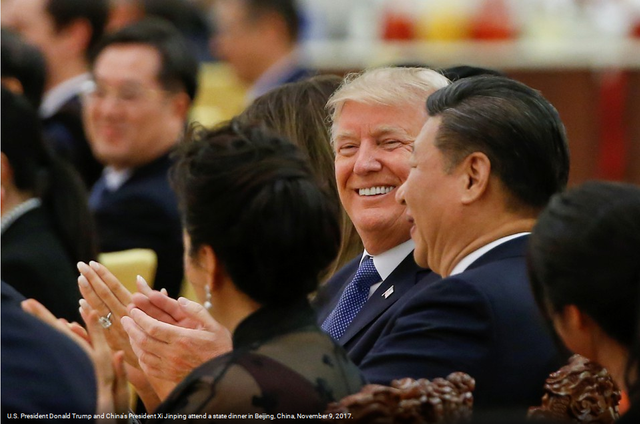Trump changed his tune in China
When Donald Trump addressed South Korea’s parliament earlier this week, The Associated Press noted his “striking shift in tone.” After Trump journeyed from Seoul to Beijing, The New York Times made a video entitled “Trump’s striking change in tone on China.”
But the change isn’t all that striking. It’s predictable. Trump insults people from afar and then praises them in person. He demands they change their behavior, and then forgets those demands when they’re in the room. He’s been doing it consistently for at least a year.
As The Associated Press noted, Trump in September tweeted, “South Korea is finding, as I have told them, that their talk of appeasement with North Korea will not work.” But this week, standing alongside South Korea’s dovish president Moon Jae In at a press conference, Trump’s belittling, hardline tone disappeared. Instead, he said, “It makes sense for North Korea to come to the table and make a deal that is good for the people of North Korea and for the world.” As my colleague Uri Friedman has noted, Trump—who during the campaign suggested U.S. troops should leave the peninsula because the South Koreans “do not pay us what they should be paying us,” also lavishly reaffirmed his commitment to South Korea’s defense.

In Beijing, it was much the same. During the campaign, Trump said China is “ripping us like you’ve never seen” and “we can’t continue to allow China to rape our country.” But once actually in China, Trump blamed all this not on China’s government but on his incompetent American predecessors. While citing the “unfair trade practices that drive” a “shockingly” large trade deficit, Trump insisted, “I don’t blame China. After all, who can blame a country for being able to take advantage of another country for the benefit of its citizens?” To the contrary, he said—as the Chinese crowd applauded—“I give China great credit.”
All this fits a pattern. Again and again on the campaign trail, Trump insulted undocumented Mexican immigrants and promised to remove them from the country. But in August of last year, when he finally sat down with his Hispanic advisory council, media reports called him “humble” and “conciliatory.” Rather than reiterate his pledge to round up the undocumented, Trump—according to one participant—said “deporting them is neither possible nor humane.”
Not long after that, Trump met President Enrique Peña Nieto in Mexico City. Instead of discussing his signature campaign proposal—a wall across America’s southern border paid for by Mexico—Trump’s advisers insisted beforehand that neither side raise the subject. And when Peña Nieto did anyway, Trump advisor Rudy Giuliani reportedly insisted that the subject was “off the table.”
At his press conference in Mexico City, Trump called his meeting with Peña Nieto a “great, great honor” and said he had “tremendous feelings” for the “tremendous” Mexican-American people—the same people he had earlier labeled rapists.
Then Trump flew to a rally in Arizona, where, according to The Washington Post, he abandoned his “subdued and cooperative tone” and “returned to the aggressive tenor that has defined much of his campaign.” Speaking to an overwhelmingly white crowd, Trump bellowed, “Anyone who has entered the United States illegally is subject to deportation.”
Trump’s interactions with African Americans have been similar. In front of mostly white audiences, Trump during the campaign accused Black Lives Matter of encouraging attacks on police and suggested that African Americans were prone to voter fraud. But in September, when Trump addressed a mostly black church in Detroit, he didn’t repeat any of that. To the contrary, he called black churches “the conscience of our country” and praised them for moving America “toward a better moral character, a deeper concern for mankind, and spirit of charity and unity that binds us all together.” In a report on the trip, The Washington Post noted—you guessed it—Trump’s “jarring shift in tone and message.”
Most politicians shift their tone depending on their audience. It’s human nature, especially for people trying to win votes. Trump’s gyrations, however, are particularly extreme.
One reason may be his sheer ignorance. Trump knows so little that—when he actually meets the people he rails against—he may be more easily swayed by their arguments. After repeatedly insisting that China could bring North Korea to its knees, Trump—after meeting President Xi in April—admitted that, “After listening for 10 minutes, I realized it’s not so easy.”
Another possible explanation for his radical shifts may be that, when Trump meets formally with foreign leaders—or even organized constituencies—his advisers enjoy a greater influence over what he says. When Trump is on the stump, or on Twitter, he is less encumbered by his advisers.
But underlying all of this is the simple matter of Trump’s character. He’s highly susceptible to flattery, and feels little obligation today to honor what he said yesterday. Above all, he’s obsessed with the image of himself as tough but has lived a coddled life in which that self-image has rarely truly been tested. All of which means that, when face to face with adversaries able to push back, he’s even more likely than other politicians to give way. The Chinese and South Koreans, it appears, have figured that out.